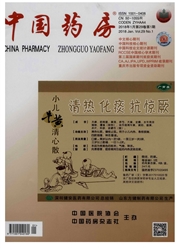

 中文摘要:
中文摘要:
目的:研究药学服务在社区糖尿病康复管理中的作用。方法:选择居家治疗的社区糖尿病患者163例,随机分组。对照组58例,采用传统发药窗口进行药学干预;家庭访视组51例,采取上门服务或电话随访方式;群体教育组54例,采取集中教育和互动的方式。后二组均定期进行用药教育,并设立咨询服务台提供用药知识咨询服务。结果:对照组、家庭访视组和群体教育组的规律服药率分别为43.1%、78.4%和64.8%,用药依从性分别为51.7%、82.4%和70.4%,血糖达标率分别为29.3%、54.9%和48.1%,糖化血红蛋白达标率分别为13.7%、31.4%和31.5%,ADR发生率分别为43.1%、19.6%、24.1%。以上指标家庭访视组和群体教育组均明显优于对照组(P〈0.05)。结论:人性化的药学服务能提高糖尿病患者的康复管理质量。
 英文摘要:
英文摘要:
OBJECTIVE: To explore the method of pharmaceutical care which influence the effect of the treatment for diabetes mellitus at home. METHODS: 163 patients with diabetes mellitus in community who received treatment at home were selected, and then randomly divided into control group (58 cases), family visit group (51 cases) and group education group (54 cases) ; control group were given pharmaceutical intervention with traditional dispensing window; family visit group received door-to-door service or telephone follow-up service; group education group were given collective education and interactive way. The latter two groups were all given regular drug education, and the advisory desk was set up and provided consulting services about medication knowledge. RESULTS: After providing pharmaceutical care, the regular medication rate of 3 groups were 43.1%, 78.4% and 64.8%; medication adherence were 51.7%, 82.4% and 70.4%; the rates of blood glucose at target level were 29.3%, 54.9% and 48.1% ; the rates of glycosylated hemoglobin at target level were 13.7%, 31.4% and 31.5%, ADR occurance rates were 43.1%, 19.6% ,24.1%. These index of family visit group and group education group were all better than those of control group significantly (P〈0.05). CONCLUSIONS: Humane pharmaceutical care can improve the quality and effect of the treatment for diabetes mellitus.
 同期刊论文项目
同期刊论文项目
 同项目期刊论文
同项目期刊论文
 期刊信息
期刊信息
